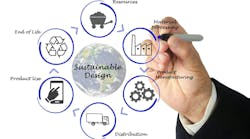The role of mobile apps in sustainable, eco-friendly manufacturing
The manufacturing industry is stepping into a new, greener chapter in the unfolding environmental narrative. This significant change, fueled by the growing realization of our planet's fragile state, is inspiring companies to warmly welcome manufacturing processes that do less harm and more good for our environment.
The transition is palpable and measurable—the global green-technology and sustainability market, valued at around $13.76 billion US in 2022, is forecast to soar to almost $62 billion by 2030, reflecting an impressive compound annual growth rate of 20.8% from 2023 to 2030.
Mobile applications are becoming the reliable sidekicks in this transformative journey, endorsing eco-friendly practices and advancing sustainability in manufacturing. This refreshing change shows that being green and profitable are not mutually exclusive in manufacturing.
How mobile apps revolutionize sustainability
1. Real-time energy monitoring: Enterprise mobile apps enable instant access to critical data, which empowers companies to identify energy-efficient practices and proactively address areas of waste. With granular insights at their fingertips, manufacturers can optimize equipment usage, implement energy-saving measures, and streamline operational processes.
An energy-monitoring mobile app can offer custom energy reports and automated alerts for unusual energy-consumption patterns. Additionally, manufacturers can incorporate energy-saving measures such as scheduling equipment downtimes during non-peak energy hours—a move made seamless with the help of these real-time monitoring apps. Integrating these pocket-sized powerhouses into business operations can pave the way for a greener and more cost-efficient manufacturing process.
2. Supply chain transparency: Supply chain transparency facilitated by mobile apps offers manufacturers and consumers a transformative window into the journey of raw materials and products. These apps enable real-time tracking and documentation of every step in the supply chain, from sourcing raw materials to the final products' delivery.
Numerous companies leverage mobile apps to enhance their sustainability credentials and gain a competitive edge. For instance, multinational corporations like Patagonia have integrated supply chain transparency apps, providing consumers with detailed information about their products' environmental and social impact. Such initiatives build trust and loyalty with consumers and encourage other manufacturers to follow suit, fostering a collective commitment to sustainability across the industry.
3. Waste-management and recycling apps: Based on observed facts and figures, it is projected that by 2050, global municipal solid-waste generation will surge by approximately 70%, reaching a staggering 3.4 billion metric tons.
Mobile apps dedicated to waste management and recycling present manufacturers with a powerful tool to track waste generation and implement efficient recycling practices. These apps facilitate real-time monitoring and data collection, enabling companies to gain valuable insights into their waste streams and identify areas for improvement.
4. Carbon-footprint calculators: According to the statistics provided by the Energy Information Administration, it is estimated that one kilogram of CO2 is emitted from coal to generate one-kilowatt hour of electricity, making it vital to track carbon emissions during manufacturing.
Mobile apps can also be designed as carbon-footprint calculators to offer manufacturers an essential tool to gauge their environmental impact based on their activities. Companies can accurately assess their carbon emissions by inputting data related to energy consumption, transportation, and production processes. Armed with this information, manufacturers can set meaningful emission-reduction targets to align with international environmental goals and commitments. Beyond operational benefits, companies can leverage carbon-footprint awareness to enhance their brand image as environmentally responsible entities.
5. Eco-friendly product design: Mobile apps specializing in eco-friendly product design revolutionize how manufacturers conceptualize and create sustainable products. Manufacturers gain valuable assistance in selecting environmentally conscious materials, reducing waste, and optimizing product design for a reduced environmental impact.
6. Sustainable materials: By offering a database of environmentally conscious options, these apps empower manufacturers to make responsible choices that reduce their products' environmental impact.
7. Lifecycle assessments: Mobile apps enable comprehensive lifecycle assessments, analyzing a product's environmental footprint from raw-material extraction to disposal. This data-driven approach informs design decisions, fostering circular economy principles and minimizing waste throughout the product's lifecycle.
Conclusion
Mobile apps have emerged as powerful enablers of sustainability in manufacturing, revolutionizing various aspects of the industry. Embracing mobile apps empowers manufacturers to drive positive change, reduce their ecological footprint, and foster eco-friendly practices throughout their operations.
The manufacturing industry is stepping into a new, greener chapter in the unfolding environmental narrative. This significant change, fueled by the growing realization of our planet's fragile state, is inspiring companies to warmly welcome manufacturing processes that do less harm and more good for our environment.



